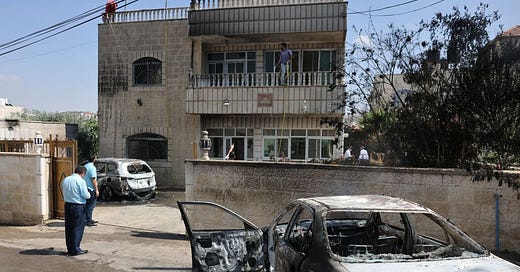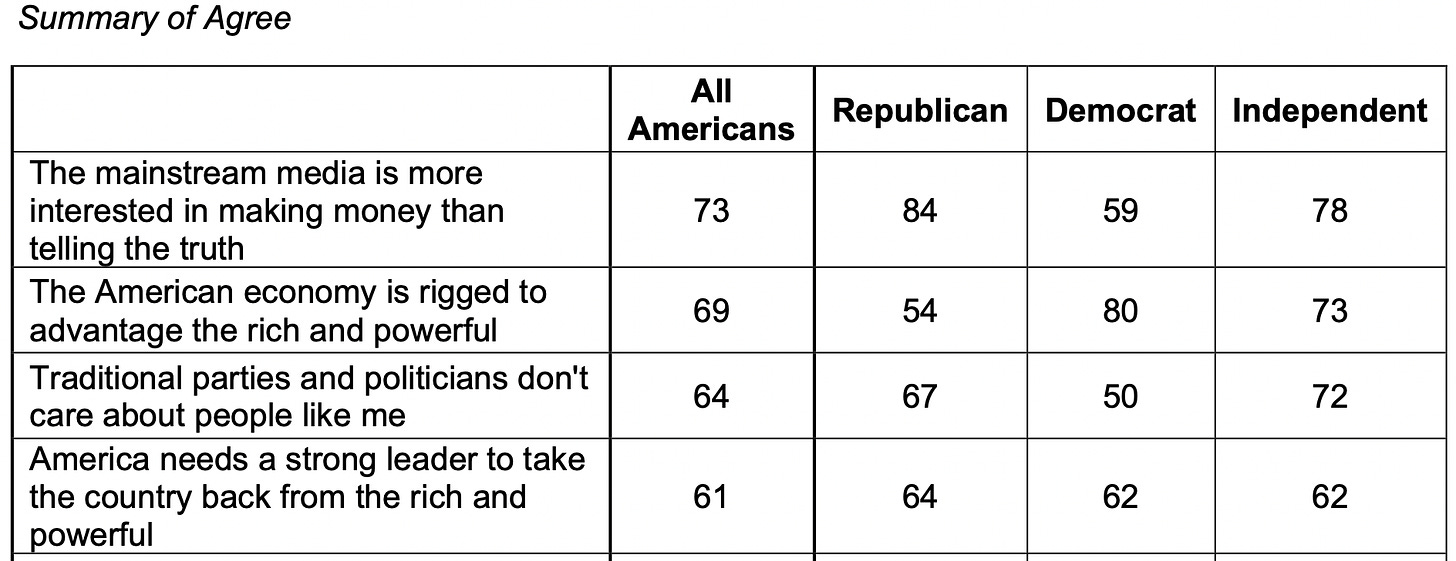TL(PM) DIGEST: Populism rising
Plus indirect talks with Iran, investors turning sour on downtown America, and yet more violence in the West Bank

1. Populist sentiments run deep among Americans
What happened? New Ipsos polling finds nearly 7 in 10 American adults agreeing with the idea that, “The American economy is rigged to advantage the rich and powerful,” including 8 in 10 Democrats, nearly three quarters of independents, and more than half of Republicans.
Why does it matter? Americans across party lines hold deep populist views about the country, including nearly three quarters of Americans who believe that, “The mainstream media is more interested in making money than telling the truth,” and almost two thirds of Americans who feel that, “Traditional parties and politicians don’t care about people like me.”
Disconcertingly in terms of liberal democratic norms, more than 6 in 10 Americans currently believe that, “America needs a strong leader to take the country back from the rich and powerful,” including equal proportions of Republicans, Democrats, and independents.
TLP’s take: America’s politics and its economic model clearly aren’t working for most Americans. Populist sentiments throughout history have provided a necessary release valve for pent up anger and demands, and sometimes lead to important political reforms. But the public openness to authoritarian rule in response to perceived structural problems in American life augurs nothing good for our government.
2. U.S. and Iran in indirect talks on nuclear issues, hostages
What happened? The United States and Iran started indirect bilateral negotiations several months ago, with the Biden administration hoping to achieve understandings and agreements that would, the Washington Post reports,
curtail Tehran’s nuclear program short of weapons development, end its proxy attacks on U.S. forces in Syria and bring home three longtime American prisoners in exchange for limited access to some of Iran’s billions of dollars frozen overseas.
The talks appear to be occurring through several channels, with Oman serving as intermediary on nuclear and regional security talks while Switzerland handles negotiations to release American hostages.
Why does it matter? Attempts to revive the 2015 nuclear deal with Iran or negotiate a new agreement have failed since the Biden administration took office. Meanwhile, American hostages Emad Shargi and Morad Tahbaz have been held by Tehran since 2018 and Siamak Namazi since 2015.
TLP’s take: It’s unlikely Tehran has any real interest in establishing strategic guardrails on its tensions with the United States, though it probably doesn’t hurt for the Biden administration to make the attempt. Better to focus on obtaining the release of American citizens held hostage by the Iranian regime for the better part of a decade now.
3. Investors turning sour on downtown America
What happened? The Wall Street Journal reports that investors are turning against America’s downtowns. For example:
Investors are paying less for bonds linked to New York subways and buses. Downtown-focused real-estate investment trusts trade at less than half their prepandemic levels. Bondholders are demanding extra interest to hold office-building debt.
Why does it matter? The continuing pandemic-driven shifts towards remote work have left many major metropolitan areas with fewer people in downtown offices resulting in diminished economic activity. Subsequently, some big time investors are pulling back:
One indication of investors’ wariness of downtowns can be seen in how they price bonds backed in part by commuter fares. The lower a bond’s price, the higher its interest yield. In New York, some bonds partly backed by bus, subway and commuter-train fares yielded a lofty 1.25 percentage points above top-rated municipal bonds on June 14, a spread 56 percent wider than before Covid, according to ICE Data Services, a financial analytics company.
TLP’s take: Although America’s suburbs are taking full advantage of the work and demographic shifts underway, it behooves everyone in metro regions, including investors, to ensure basic economic stability and activity in core downtown areas—perhaps focused on creative new ways to improve the quality of life and work arrangements for everyone. Otherwise, metro regions will end up in a vicious cycle of lackluster economic activity leading to lower municipal revenue and investments with declining public services and more crime and homelessness.
4. Unrest unsettles the West Bank once again
What happened? Jewish settlers went on a rampage in the West Bank town of Turmus Aya that left one Palestinian dead, a day after four Israelis were shot and killed by a pair of Palestinians affiliated with Hamas. Israeli troops previously killed seven Palestinians in a fierce firefight that broke out during a Monday raid in the West Bank city of Jenin.
Why does it matter? This spasm of violence illustrates the inherently volatile and precarious nature of the current status quo in the West Bank, a situation only likely to get worse as the Palestinian Authority’s sway continues to recede and Israeli settlers grow increasingly bold in their violent reprisals against Palestinians. It also comes amidst Israel’s ongoing domestic political crisis, as Prime Minister Netanyahu attempts to revive his plans to take effective control of Israel’s judicial branch.
TLP’s take: As much as the Biden administration might like to simply ignore the Israeli-Palestinian conflict, there are just too many ways a single incident could spark a larger conflagration—especially given how much the current Israeli government has sought to upset the previous status quo, both in the West Bank and Israel itself. It’s futile to push talks between Israelis and Palestinians right now, but the United States can at least try to prevent things from getting even worse.
Just one more thing…
Happy summer solstice! This year, our sun nears the peak of its typical eleven-year cycle of activity, meaning (among other things) more aurorae in the Northern Hemisphere that will be observable even further south than usual—even in places like Alabama and Arizona.







